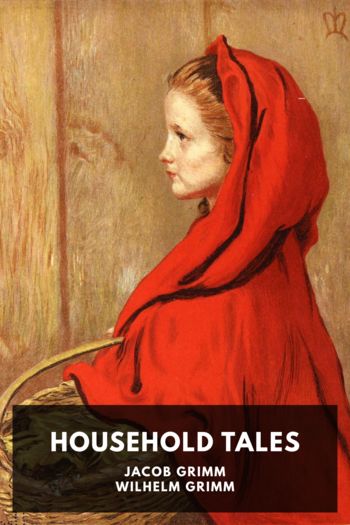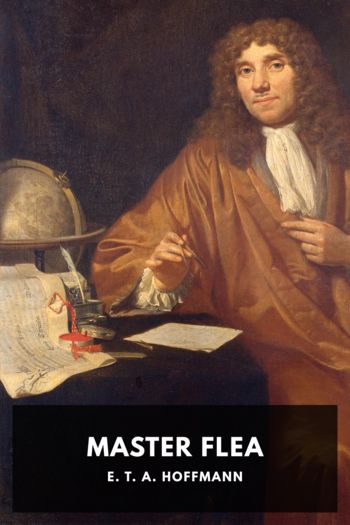Household Tales by Jacob Grimm (classic books for 12 year olds .txt) 📕

- Author: Jacob Grimm
Book online «Household Tales by Jacob Grimm (classic books for 12 year olds .txt) 📕». Author Jacob Grimm
“Whither goest thou?”
“To Walpe.”
“I to Walpe, thou to Walpe, so, so, together we’ll go.”
“Hast thou a man? What is his name?”
“Cham.”
“My man Cham, thy man Cham; I to Walpe, thou to Walpe; so, so, together we’ll go.”
“Hast thou a child; how is he styled?”
“Wild.”
“My child Wild, thy child Wild; my man Cham, thy man Cham; I to Walpe, thou to Walpe, so, so, together we’ll go.”
“Hast thou a cradle? How callest thou thy cradle?”
“Hippodadle.”
“My cradle Hippodadle, my child Wild, thy child Wild, my man Cham, thy man Cham; I to Walpe, thou to Walpe, so, so, together we’ll go.”
“Hast thou also a drudge? what name has thy drudge?”
“From-thy-work-do-not-budge.”
“My drudge, From-thy-work-do-not-budge: my child Wild, thy child Wild; my man Cham, thy man Cham; I to Walpe, thou to Walpe; so, so, together we’ll go.”
The Lambkin and the Little FishThere were once a little brother and a little sister, who loved each other with all their hearts. Their own mother was, however, dead, and they had a stepmother, who was not kind to them, and secretly did everything she could to hurt them. It so happened that the two were playing with other children in a meadow before the house, and there was a pond in the meadow which came up to one side of the house. The children ran about it, and caught each other, and played at counting out.
“Eneke Beneke, let me live,
And I to thee my bird will give.
The little bird, it straw shall seek,
The straw I’ll give to the cow to eat.
The pretty cow shall give me milk,
The milk I’ll to the baker take.
The baker he shall bake a cake,
The cake I’ll give unto the cat.
The cat shall catch some mice for that,
The mice I’ll hang up in the smoke,
And then you’ll see the snow.”
They stood in a circle while they played this, and the one to whom the word snow fell, had to run away and all the others ran after him and caught him. As they were running about so merrily the stepmother watched them from the window, and grew angry. And as she understood arts of witchcraft she bewitched them both, and changed the little brother into a fish, and the little sister into a lamb. Then the fish swam here and there about the pond and was very sad, and the lambkin walked up and down the meadow, and was miserable, and could not eat or touch one blade of grass. Thus passed a long time, and then strangers came as visitors to the castle. The false stepmother thought, “This is a good opportunity,” and called the cook and said to him, “Go and fetch the lamb from the meadow and kill it, we have nothing else for the visitors.” Then the cook went away and got the lamb, and took it into the kitchen and tied its feet, and all this it bore patiently. When he had drawn out his knife and was whetting it on the doorstep to kill the lamb, he noticed a little fish swimming backwards and forwards in the water, in front of the kitchen-sink and looking up at him. This, however, was the brother, for when the fish saw the cook take the lamb away, it followed them and swam along the pond to the house; then the lamb cried down to it,
“Ah, brother, in the pond so deep,
How sad is my poor heart!
Even now the cook he whets his knife
To take away my tender life.”
The little fish answered,
“Ah, little sister, up on high
How sad is my poor heart
While in this pond I lie.”
When the cook heard that the lambkin could speak and said such sad words to the fish down below, he was terrified and thought this could be no common lamb, but must be bewitched by the wicked woman in the house. Then said he, “Be easy, I will not kill thee,” and took another sheep and made it ready for the guests, and conveyed the lambkin to a good peasant woman, to whom he related all that he had seen and heard.
The peasant was, however, the very woman who had been foster-mother to the little sister, and she suspected at once who the lamb was, and went with it to a wise woman. Then the wise woman pronounced a blessing over the lambkin and the little fish, by means of which they regained their human forms, and after this she took them both into a little hut in a great forest, where they lived alone, but were contented and happy.
Simeli MountainThere were once two brothers, the one rich, the other poor. The rich one, however, gave nothing to the poor one, and he gained a scanty living by trading in corn, and often did so badly that he had no bread for his wife and children. Once when he was wheeling a barrow through the forest he saw, on one side of him, a great, bare, naked-looking mountain, and as he had never seen it before, he stood still and stared at it with amazement.
While he was thus standing he saw twelve great, wild men coming towards him, and as he believed they were robbers he pushed his barrow into the thicket, climbed up a tree, and waited to see what would happen. The twelve men, however, went to the mountain and cried, “Semsi mountain, Semsi mountain, open,” and immediately the barren mountain opened down the middle, and the twelve went into it, and as soon as they were within, it shut. After a short time, however, it opened again, and the men came forth carrying heavy sacks on their shoulders, and when they were all once more in the daylight they said, “Semsi mountain, Semsi mountain, shut thyself;” then the mountain closed together, and there was no longer any entrance to be seen to it, and the twelve went away.
When they were





Comments (0)